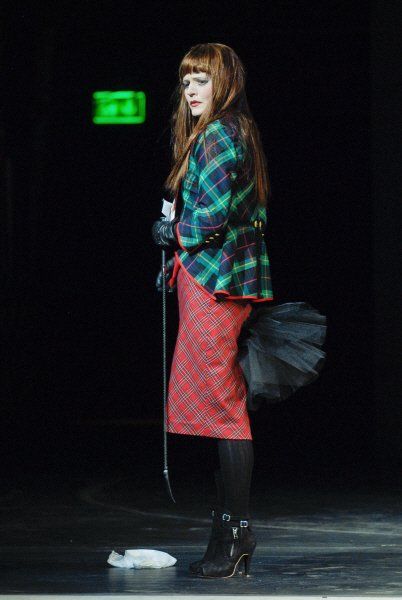Maria Stuart
Tragedy by Friedrich Schiller
Director: Torsten Krug
Set and costumes: Saskia Gorecki
Dramaturgy: Sivia Giese
Eduard von Winterstein Theater Annaberg-Buchholz
February 2010
With:
Maria Richter (Elisabeth, Queen of England)
Julia Gorr (Mary Stuart, Queen of Scots)
Tim Osten (Robert Dudley, Earl of Leicester)
Gerd Schlott (George Talbot, Earl of Shrewsbury)
Thomas Tucht (William Cecil, Baron of Burleigh)
Daniel Koch (Wilhelm Davison, Secretary of State)
Udo Prucha (Amias Paulet, Knight, Guardian of Mary)
Sven Zinkan (Mortimer, his nephew)
Nenad Zanic (Count Aubespine, French envoy / Okelly, Mortimer's friend)
Gabriele Kümmerlin (Hanna Kennedy, Maria's Nurse)
Renja-Arlene Dietze / Pascal Buschmann (a Page / Earl of Kent)
Parable of the modern political circus
Much applause for Schiller's tragedy "Maria Stuart" at the Annaberg-Buchholz Theater - the focus is on the character of the English queen
Maria throws herself on the ground begging for mercy. There she is at the top of the staircase that is the podium for the famous slugfest between the Queens of England and Scotland. At this moment, Elisabeth is standing below her. But the positions of the two rivals keep changing, just as each triumphs and loses in this merciless verbal duel. This is an exciting game, the strongest scene of the evening.
"Maria Stuart" premiered on Sunday evening at the Eduard von Winterstein Theater in Annaberg-Buchholz. And the optics alone (designed by Saskia Vollmer) suggested that director Torsten Krug is not only fulfilling an educational mandate with his production, but rather that he is making Schiller's classic a parable of the modern political circus. Hypocritical string pullers, sleazy court knaves, scheming careerists - the troupe behind the most powerful woman in England is as disgustingly selfish as the ruler is torn to her core. And it is precisely this inner conflict and the question of what does power do to people that are more clearly the director's focus than Maria's fate.
There is a woman who wants to do the right thing for her country, who has to secure her rule, who tries to assert herself in a man's world - the pressure to succeed that Elisabeth is under is immense. Maria Richter wields a crop with which she punishes and caresses her subordinates as well as keeping them at a distance. Only in very few moments, when she takes off her wig, can she be fully herself. Vulnerability and helplessness appear, but these moments are rare and short. It must not lose its outward appearance of strength, otherwise it is lost itself. Maria Richter brings this dichotomy very intensely to the stage, the almost unbearable constraints that demand decisions from her as a ruler that she as a person does not want to make. The torment of signing Maria's death warrant and incurring the guilt becomes almost physically palpable.
Elisabeth is the actually interesting character of the production, very present in Maria Richter, with too much screaming but unfortunately also too one-sided because she only offers a few nuances. Julia Gorr remains the paler part in the piece. The fact that she ultimately accepts the misjudgment based on false reports from her opponents - who assume subversive intentions - resting in her Catholic faith remains a claim of the text. As a viewer, you hardly take part in it. Sven Zinkan convinces as a passionate Mortimer, who resolutely represents Maria's cause, as does Udo Prucha as the pure guardian of the imprisoned Scottish queen. Tim Osten (Count of Leicester) and Thomas Tucht (Baron von Burleigh) embody rat-like, underhanded ambitions who use their intrigues from the background to drive the ladies in front of them. Daniel Koch alone has credible scruples for his state secretary Davison, to whom Elisabeth hands Maria's death sentence without any specific instructions. There was much applause and bravos from the premiere guests.
Uta Trinks, Chemnitz Free Press























